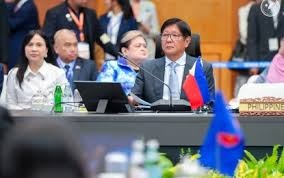KUALA LUMPUR, Malaysia – Philippine President Ferdinand R. Marcos Jr. actively leveraged his attendance at the 47th Association of Southeast Asian Nations (ASEAN) Summit and Related Summits in Kuala Lumpur to advocate for enhanced international partnerships. The President held crucial bilateral meetings with United Nations (UN) Secretary-General António Guterres and Vietnamese Prime Minister Pham Minh Chinh, signaling Manila’s intent to deepen cooperation across economic development, climate action, and global governance.

🇻🇳 Strengthening Strategic Ties with Vietnam
President Marcos met with Vietnamese Prime Minister Pham Minh Chinh on Monday night, where discussions focused on reaffirming the strong bilateral ties between the two nations. The President specifically extended his gratitude to Vietnam for its “continued assistance to the Philippines during periods of drought and rice supply challenges.” This acknowledgement underscores Vietnam’s critical role as a major rice exporter and a key partner in the Philippines’ efforts to ensure national food security.
According to a report from the Department of Foreign Affairs, conveyed via the Presidential Communications Office (PCO), both leaders expressed a firm commitment to strengthening bilateral relations across various sectors, including government, economic, and security cooperation. Key areas of mutual interest highlighted were:
Expanding economic diplomacy.
Enhancing the bilateral strategic partnership.
The bilateral meeting solidified the foundation for continued collaboration on regional stability and economic resilience, particularly concerning crucial commodities like rice.
🤝 Reaffirming Partnership with the United Nations
In his meeting with UN Secretary-General António Guterres on Sunday, President Marcos covered a wide spectrum of shared interests, collectively affirming their dedication to global objectives. Their discussion centered on maintaining peace and stability, fostering economic growth, and ensuring social development and equality.
President Marcos took the opportunity to assure the UN of the Philippines’ unwavering commitment to global challenges. “I conveyed that the Philippines will continue to be a champion of climate action and a reliable partner of the UN,” the President stated, reinforcing Manila’s commitment to environmental stewardship and international collaboration on global warming. Furthermore, Marcos expressed his desire to foster bilateral cooperation and welcomed the UN’s continued support for the ASEAN-UN framework, emphasizing the value of multi-lateral institutions.
⚖️ Championing the Rule of Law and UNCLOS

During the 15th ASEAN-UN Summit on Monday, President Marcos underscored the necessity of robust coordination between ASEAN and UN bodies to drive inclusive and sustainable progress. He passionately advocated for a “development agenda that leaves no one behind,” stressing that the true measure of partnership is tangible progress for the people, not just rhetoric.
A significant portion of the President’s address focused on the rule of law and the Philippines’ bid for a non-permanent seat in the UN Security Council for 2027-2028.
“As a trusted partner, pathfinder, and committed peacemaker, the Philippines thanks our ASEAN colleagues for their steadfast endorsement of our bid… If elected, the Philippines will continue to uphold the primacy of the rule of law and the peaceful settlement of disputes in the maintenance of international peace and security,” he asserted.
Marcos highlighted the Philippines’ recent ratification of the Agreement on Marine Biological Diversity of Areas Beyond National Jurisdiction (BBNJ Agreement) as a tangible commitment to the rules-based international order, particularly the 1982 United Nations Convention on the Law of the Sea (UNCLOS).
He further clarified the application of this commitment to regional issues: “The agreement is especially important as the Philippines is adjacent to wide swathes of high seas in the Pacific and pockets of high seas in the South China Sea, as confirmed by the 2016 South China Sea Arbitral Award.” He specified the nation’s intent to “seek to apply the Agreement to the pockets of the high seas in the South China Sea,” thereby using international law to strengthen national maritime interests.
In closing his statement at the Summit, the President reiterated the nation’s commitment to advancing the UN Sustainable Development Goals (SDGs) and urged ASEAN member states to fully harness their existing partnerships with the UN to accelerate meaningful progress toward these goals.





